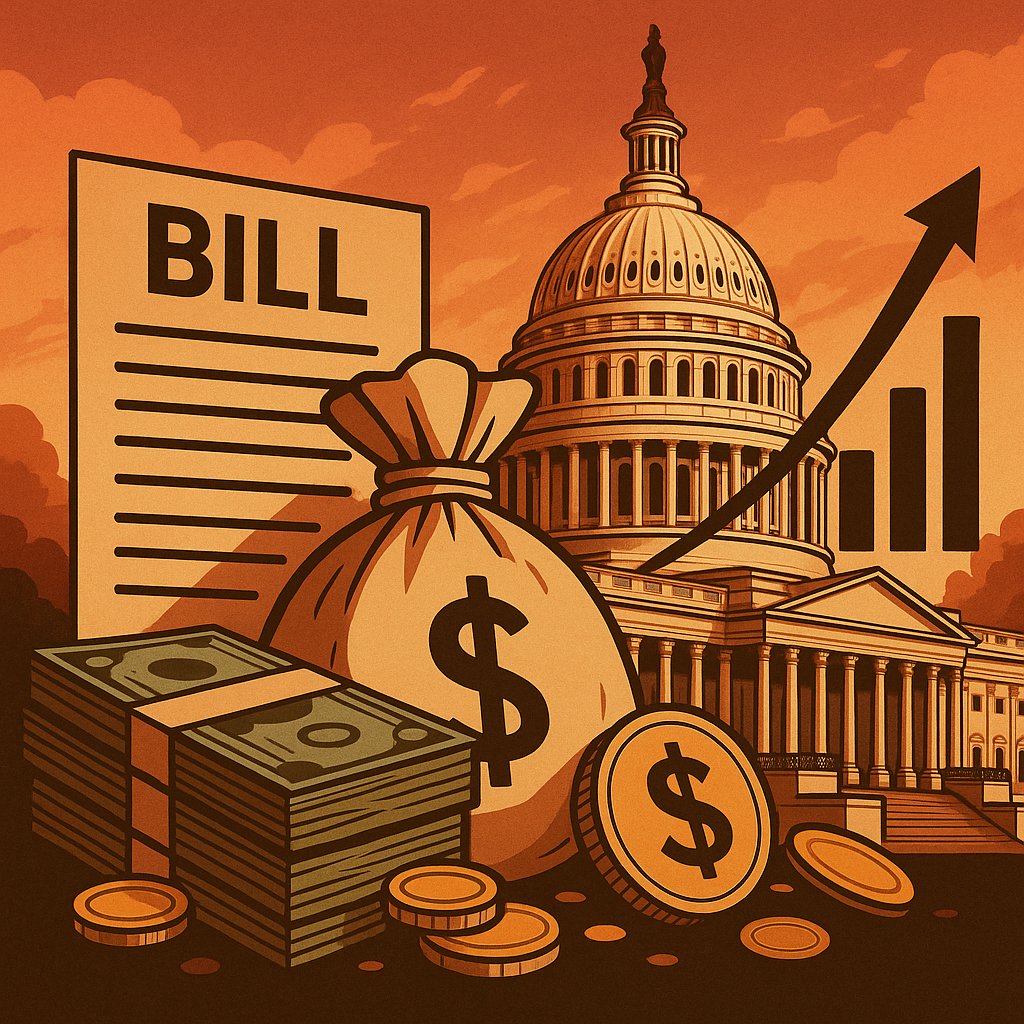As Wall Street eyes the July 4th holiday, all attention turns to Capitol Hill. The U.S. Senate is locked in contentious debate over the so-called “One Big Beautiful Bill” (OBBBA)—a sweeping, high-stakes tax-and-spending package that promises massive short-term stimulus but may unleash long-term fiscal headwinds. With over $3 trillion in new deficit spending on the table, markets are teetering between optimism and anxiety as investors digest what the bill could mean for bond yields, tax reform, and the strength of the U.S. dollar.
Uncertainty Clouds Markets Ahead of July 4 Vote
The OBBBA, endorsed by the Trump administration and a divided Republican Senate, combines corporate tax cuts, infrastructure funding, healthcare offsets, and a set of controversial investment-related measures. But its scope is what truly rattles investors: the Congressional Budget Office (CBO) estimates the bill could add $3.3 trillion to the national deficit over the next decade.
Markets are already responding. The U.S. dollar index has pulled back slightly amid debt concerns, while 10-year Treasury yields climbed past 4.5%, their highest levels in weeks. Equities, meanwhile, have edged lower in anticipation of delayed legislative action and fiscal uncertainty.
“The market’s reaction is telling,” said Lisa Wong, macro strategist at Evercore ISI. “Investors love the tax cuts, but they hate the price tag. There’s no clean win here.”
Why This Matters for Investors
For global markets, the stakes couldn’t be higher. The bill’s passage could unleash:
- Short-term stock market rallies driven by corporate-friendly tax reforms.
- Upward pressure on Treasury yields as investors demand higher returns to absorb growing U.S. debt.
- Dollar weakness, especially if the deficit triggers renewed foreign outflows from U.S. assets.
Further complicating matters is Section 899, a clause described by some as a “retaliatory tax” on foreign investors. Treasury Secretary Scott Bessent has urged its removal, citing fears it could deter foreign direct investment (FDI). If passed intact, the section could increase tax burdens for offshore holders of U.S. securities—raising alarms across global capital desks.
“Foreign investors already hold over $7 trillion in U.S. Treasury securities,” said JPMorgan’s global fixed income team in a client note. “Adding tax friction risks pushing them toward EU and Asian alternatives.”
Fiscal Risks vs. Stimulus Hopes
While the bill’s detractors point to fiscal irresponsibility, supporters argue that a one-time spending surge could reignite long-term growth. Still, market veterans warn of potential fallout if the Senate forces a party-line passage without investor-friendly amendments.
“The more this becomes about scoring political points, the worse it gets for capital markets,” said Amanda Feldman, senior economist at Moody’s Analytics. “Investors want policy clarity—not grandstanding.”
Moreover, the political calendar adds urgency. A failed vote this week could push the debate into the August recess, extending volatility across equities, bonds, and foreign exchange markets.
Key Investment Insight
In the near term, investors should prepare for heightened volatility and potentially sharp moves across rates, FX, and equities. Consider:
- Hedging rate exposure in long-duration bonds.
- Positioning defensively in sectors resilient to tax and fiscal uncertainty (e.g., healthcare, utilities).
- Monitoring REITs and multinationals, as foreign-investor taxation and FX moves could impact earnings and capital flows.
Analysts also suggest watching Treasury Inflation-Protected Securities (TIPS), given the dual threat of deficit-driven inflation and yield curve steepening.
Stay Ahead
As fiscal fireworks unfold in Washington, MoneyNews.Today continues to track every market-relevant policy development in real time. From tax reform to bond market reactions, stay informed and stay ahead with expert insights designed for today’s investor.





